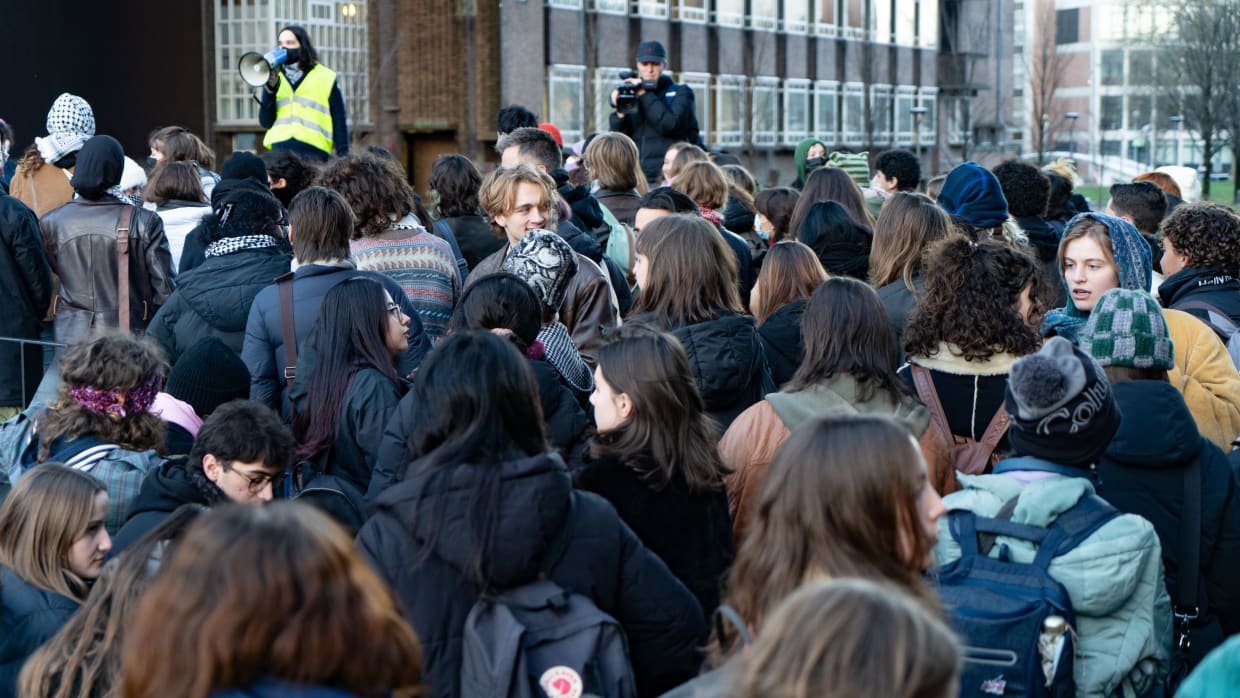
Kirsty McHenry | Not under my roof: the arbitrariness of the UvA house rules
The UvA’s ban of the pro-Palestine demonstration on the Roeterseiland campus is a good example of how ambiguous its house rules are, writes Kirsty McHenry. “What the UvA understands by an expression of public belief is unclear and nowhere defined. This vagueness suggests that the mere utterance of frustration at a stalled printer could result in even the most honourable student being thrown off campus.”
Roughly a month ago today, on a bitterly cold day in mid-January, students arrived at their university on the Roeterseiland Campus to find themselves barred from entering and the doors to several of the main buildings locked. Among those standing flustered outside was a group of students who had gathered for a pre-announced pro-Palestinian sit-in in the suddenly inaccessible main hall. Peering closer to read a flyer that had been hastily tacked to the glass, they learnt that the buildings’ closure was an attempt by the university to block the demonstration. According to the flyer the sit-in had not received permission from the administration, thereby going against the UvA house rules. Furthermore, it implied that the protest would compromise the social safety of other students and staff. Though the demonstration ultimately went ahead anyway, the protesters were forced into a state of limbo where, on the bridge outside the entrance, they were still on campus grounds if not inside the university buildings themselves.
The details of the house rules tend not to be known by the average student or, it seems, the administration itself (given their sporadic application). However, upon closer inspection it almost appears that the UvA would prefer for them to remain an ambiguous – rather than consistent and explicit – set of regulations. For example, the most contentious of the Roeterseiland house rules states (in the English-language version) that written permission must be obtained in advance from the UvA service desk before students partake in “demonstrations” or “expressions of public and/or political beliefs”. What the UvA considers to be an expression of a public belief is unclear and nowhere in the document is it defined. Such vagueness suggests that merely exclaiming frustration at a jammed printer could get even the most upstanding thrown off campus grounds and landed in a crumpled heap at the feet of some previously banished smokers.
Of course, the real weakness of the house rules is how ripe they are for unwarranted suppression and hypocrisy. The anti-protest and anti-cultural expression trappings of the rules (which are extended to include “expressions of a cultural, political and/or religious nature” in the UvA-wide framework for house rules) reveal several not-so-hidden biases in the university administration. As much was acknowledged back in November by the dean of the Faculty of Social and Behavioural Sciences who agreed that the treatment of Ukraine versus that of Palestine had been unequal. She confessed that “the UvA should not have posted Ukrainian flags on the windows [in the past] since that is the same as saying “free Palestine”” while reiterating that the “university is not a political organisation”. Despite this admission, the UvA has maintained its condemnation of Russia’s invasion of Ukraine and boycott of Russian universities but has made no such action regarding the invasion of Gaza.
What the UvA administration ignores is that – whether they are candid about it or not – they are expressing political views all the time. From my perspective as a student, the UvA administration gives the impression that it cares less about guarding my and other’s social safety (which it presents as its primary concern) and more about adhering to whatever stance fits the wider political landscape of the moment. Now, as the Netherlands continues to slide further into far-right populism, it is hard to know what kinds of expression the UvA administration will choose to clamp down on next.

